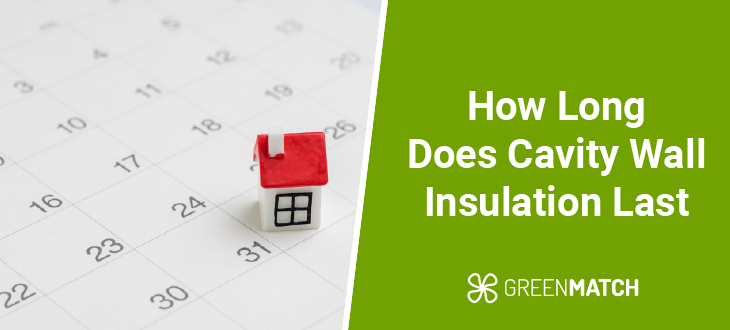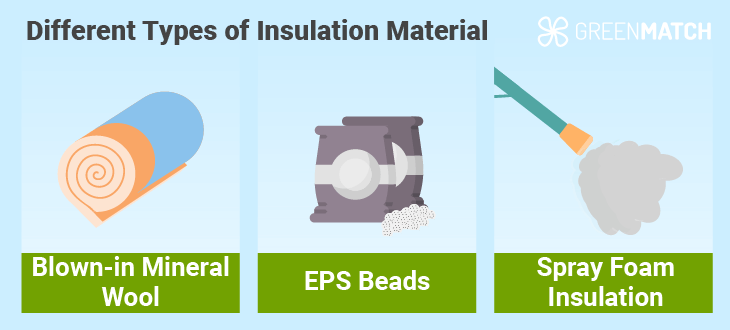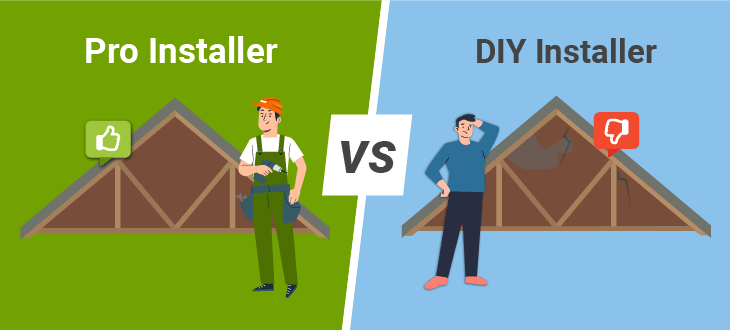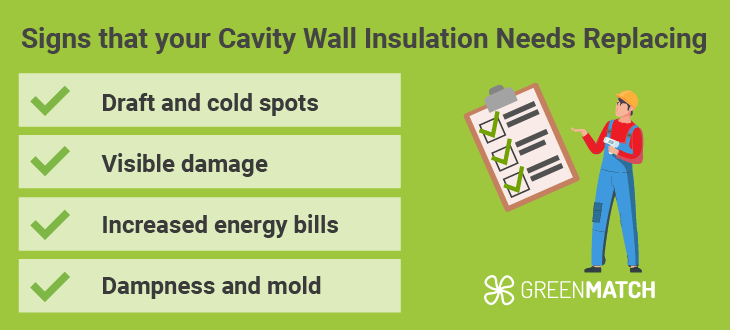Answer these simple questions and we will find you the BEST prices
Which type of solar quotes do you need?
It only takes 30 seconds
100% free with no obligation

Get Free quotes from insulation specialists near you

Save money by comparing quotes and choosing the most competitive offer

The service is 100% free and with no obligation
- GreenMatch
- Insulation
- Wall Insulation
- Cavity Wall Insulation
- How Long Does Cavity Wall Insulation Last
How Long Does Cavity Wall Insulation Last: A UK Guide


- Cavity wall insulation typically lasts between 20 and 100 years, and many insulation manufacturers offer a 25-year warranty on their materials.
- If your home was built after the 1920s when building regulations changed, then it likely has cavity walls instead of solid walls.
- A rushed installation, use of poor-quality materials, and damage to the walls can reduce the effectiveness and durability of your cavity wall insulation.
Cavity wall insulation is crucial in creating a cosy and comfortable home environment. Preventing dampness and mould helps ensure the air inside your home is clean and healthy.Are you curious about how long cavity wall insulation lasts? Generally, it's designed to last for many decades. But, as with any home feature, various factors can influence its performance.
Considering insulating your home? Let GreenMatch take the hassle out of the process. Instead of spending hours online and setting up appointments, simply fill out our quick online form in just 30 seconds. We'll then provide you with up to 3 free quotes from trusted installers in your area. Start now by clicking the button below!
- Describe your needs
- Get free quotes
- Choose the best offer
It only takes 30 seconds



How long does cavity wall insulation last in the UK?
Cavity wall insulation can typically last 25 years or even your property's lifetime if appropriately installed using high-quality materials. The lifespan of the insulation can be influenced by factors such as the quality of installation, the type of materials used, and exposure to moisture. To assure the best performance, hiring a qualified installer, choosing appropriate materials, and maintaining proper home ventilation are essential. Consulting a professional can help guarantee long-lasting insulation results.
| Insulation type | Durability |
|---|---|
| Cavity wall | Around 25 years |
| External wall | 25 years or more |
| Loft insulation | Around 50 years |
Lifespan of cavity wall insulation materials
The longevity of cavity wall insulation materials varies. Polystyrene beads can last up to 100 years due to their resistance to moisture and decay. Polyurethane foam and mineral wool are durable, typically lasting over 50 years. Extruded polystyrene (XPS) has a 20—to 30-year lifespan, and fibreglass can last 80—to 100 years. The choice of material and proper installation are both crucial for long-term effectiveness.
| Insulation material type | Durability |
|---|---|
| Mineral Wool | 50 years |
| Polystyrene Beads | Up to 100 years |
| Extruded Polystyrene (XPS) | Extruded Polystyrene (XPS) |
| Polyurethane Foam | More than 50 years |
| Fiberglass | 80 to 100 years |
What factors influence how long the cavity wall insulation will last?
Various factors will influence the lifespan of cavity wall insulation, potentially leading to degradation of the insulation material over time:
Installation quality
If the insulation isn't installed correctly, it can leave gaps that make it less effective. These gaps let heat out in winter and during summer, forcing your HVAC system to work more and causing higher energy bills. This can lead to insulation failure over time; proper installation guarantees full coverage, which keeps the insulation working well for longer.
Material type

Different types of insulation materials have different characteristics regarding durability and susceptibility to environmental factors. For example, mineral wool may be more susceptible to moisture-related issues than foam insulation. Understanding these differences can help make informed decisions when selecting the best cavity insulation material for specific applications.
When improving energy efficiency and insulation at home, start by considering wall insulation. Identify your wall type (a cavity or solid) and choose the best insulation. The main types are:
- Blown-in Mineral Wool
- EPS Beads
- Spray Foam Insulation
Mineral wool cavity wall insulation is affordable but may settle over time, reducing energy efficiency. EPS beads are a great alternative and cover all gaps in the cavity without needing cavity boards. The latest EPS insulation technologies add an adhesive layer to prevent bead leakage from cavity walls. Consider spray foam insulation for superior thermal protection and an airtight seal.
Moisture exposure
Prolonged exposure to excessive moisture can cause insulation materials to deteriorate, especially those without moisture resistance. This deterioration can eventually lead to mould growth and reduce the effectiveness of the insulation.
Cracks in the wall allow water to enter the cavity wall. However, by performing regular maintenance and occasional inspections, you can detect and address any cracks, thereby taking control of the situation and preventing further damage.
Extreme temperatures, heavy rainfall, and high humidity levels can all affect the performance and durability of cavity wall insulation. Insulation may expand and contract in regions with frequent temperature fluctuations, potentially leading to gaps or cracks. Excessive moisture from rain or humidity can penetrate poorly sealed or damaged walls, causing the insulation to degrade or develop mould. To mitigate these effects, ensure that your insulation is installed by professionals who can address weather-related challenges and that your home is well-maintained to prevent weather-induced damage.
Regular inspections and proper sealing can help maintain the insulation's effectiveness despite varying weather conditions.
Pest infestation
Rodents like mice and rats and insects such as termites and ants can cause substantial damage to insulation materials. They do this by burrowing into or nesting within the insulation, which can diminish its ability to regulate temperature and provide energy efficiency within a building. Entry points, such as cracks in the wall, allow them to access the cavity wall.
Temperature fluctuations
Extreme temperature variations can significantly impact the physical properties of certain insulation materials. When exposed to rapid temperature changes, these materials may expand and contract, ultimately resulting in their degradation over time. Consequently, it's essential to consider the suitability of insulation materials for specific environments to ensure long-term effectiveness and performance.
Wall conditions
Keeping your walls in good condition is essential to guarantee that cavity wall insulation lasts long. If your walls have cracks, gaps, or poor ventilation, this can reduce the effectiveness of the insulation. Moisture problems or structural shifts can also damage the insulation. Regular inspections can help catch these problems early. Repairing any wall issues and securing good ventilation is important to keep the insulation working well. Professional inspections can be a good investment for the long-term performance of your insulation.
Professional vs DIY installation

Cavity wall insulation needs to be appropriately installed to last a long time. Professional installation is necessary to ensure the insulation is put in correctly, with full coverage and no gaps. This makes the insulation last longer. Professionals know how to choose suitable materials and fix any issues, like moisture or structural problems, and they often provide a 25-year guarantee. On the other hand, DIY installation often leads to common problems like incomplete coverage, inadequate sealing, and even structural damage.
Address these factors to keep your cavity wall insulation working well for a long time. Consult with a qualified professional to have a cavity wall insulation check. This way you can ensure your home remains comfortable, energy-efficient, and benefits from the long-lasting advantages of properly installed cavity wall insulation.
Does cavity wall insulation need renewing?
In the UK, cavity wall insulation typically lasts 25 years or even the house's lifespan when properly installed by a professional. However, damage during construction, renovations, or moisture problems may necessitate repairs or refilling. Regular property inspections and professional advice are recommended for maintenance and longevity.
Signs that your cavity wall insulation needs replacing

Even with professional installation, cavity wall insulation will deteriorate over time. It's important to be aware of the signs that indicate the need for replacement. By staying informed, you can take proactive steps to maintain your home's energy efficiency and comfort.
- Drafts or cold spots: If you're noticing cold spots or drafts in your home, it's essential to address your insulation. These issues are often signs of gaps or insulation settling, leading to energy inefficiency and discomfort.
- Dampness and mould: Moisture issues, such as damp walls or mould growth, may indicate that the insulation has degraded or allowed moisture to seep.
- Visible damage: Cracks, gaps, or damage in the exterior walls may compromise the integrity of the insulation, requiring replacement.
- Increased energy bills: A sudden increase in heating or cooling expenses may indicate ineffective insulation.
If your insulation is over 20-25 years old, consider an upgrade, as insulation materials can degrade with age. This proactive step can help maintain your home's energy efficiency and comfort. It's essential to promptly address any signs of degradation to ensure that your home remains energy-efficient and comfortable.
In some cases, cavity wall insulation might not be suitable due to the type of cavity or the presence of existing insulation. If you're unsure about the suitability of cavity wall insulation for your home, exploring alternatives to cavity wall insulation methods is a wise decision.
Are you looking for insulation professionals? GreenMatch has qualified installers who can assess and replace your cavity wall insulation. Fill out our quick online form to get up to 3 free quotes from trusted installers in your area. Click below to start now!
- Describe your needs
- Get free quotes
- Choose the best offer
It only takes 30 seconds



FAQ
Cavity wall insulation usually lasts 25 years or more. Still, it may need replacement due to material degradation, moisture damage, structural changes, increased energy bills, or visible issues like dampness and mould. If you observe any of these signs, it’s important to consult a professional to evaluate and replace your insulation to restore your home’s energy efficiency.
Yes, cavity wall insulation can degrade over time. Material type, moisture exposure, temperature changes, and structural shifts can impact insulation longevity. Over time, insulation may settle, develop gaps, or lose its insulating properties, leading to reduced energy efficiency. Regular inspections and maintenance can help identify degradation early. It’s important to consult a professional to assess and update insulation for optimal home comfort and energy efficiency.
Yes, cavity wall insulation may need replacing over time. Although insulation is designed to last many years, factors such as material degradation, moisture damage, structural changes, and increased energy bills can indicate the need for replacement. If you notice signs like dampness, mould, or cold spots, it’s essential to consult a professional to assess the condition of your insulation. Regular inspections can help maintain optimal performance.
Yes, cavity wall insulation is usually a good choice for many homeowners because it offers many benefits. Proper insulation improves energy efficiency and indoor comfort. It reduces moisture, prevents mould, and protects your home’s structure. Despite the upfront cost, it’s a worthwhile long-term investment. Professional installation maximises effectiveness and longevity.

Akif is a copywriter at GreenMatch since 2023. With a keen interest in community sustainability, green solutions and the role of digital media in identifying climate trends, he aims to hone in on his background in International Studies and Digital Media to provide a multidisciplinary approach to written content rooted in credible research and accuracy.
We strive to connect our customers with the right product and supplier. Would you like to be part of GreenMatch?

